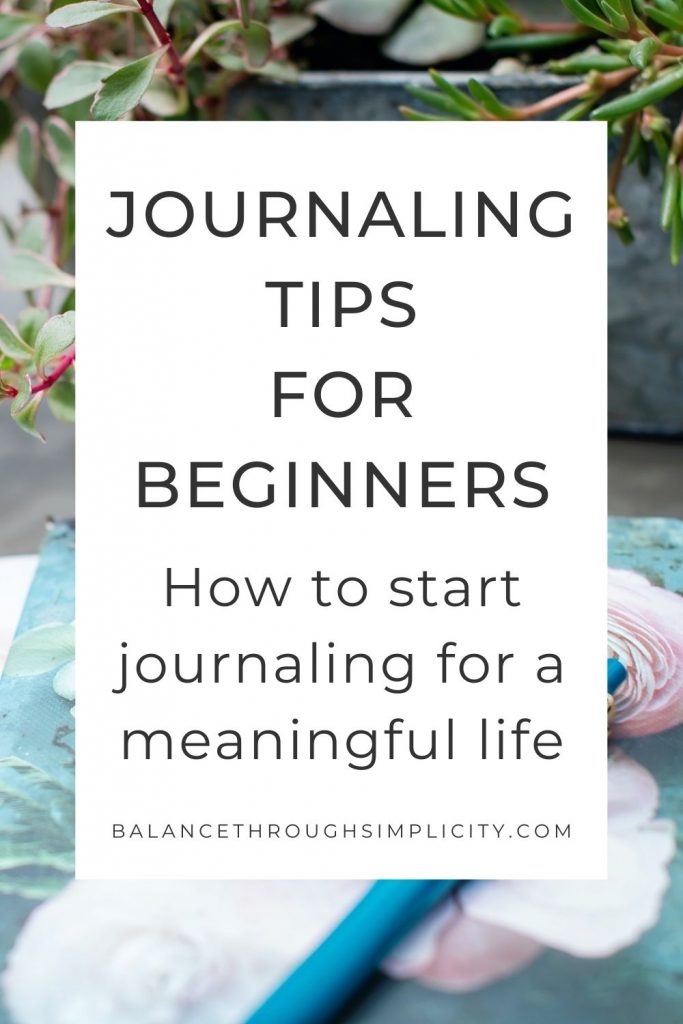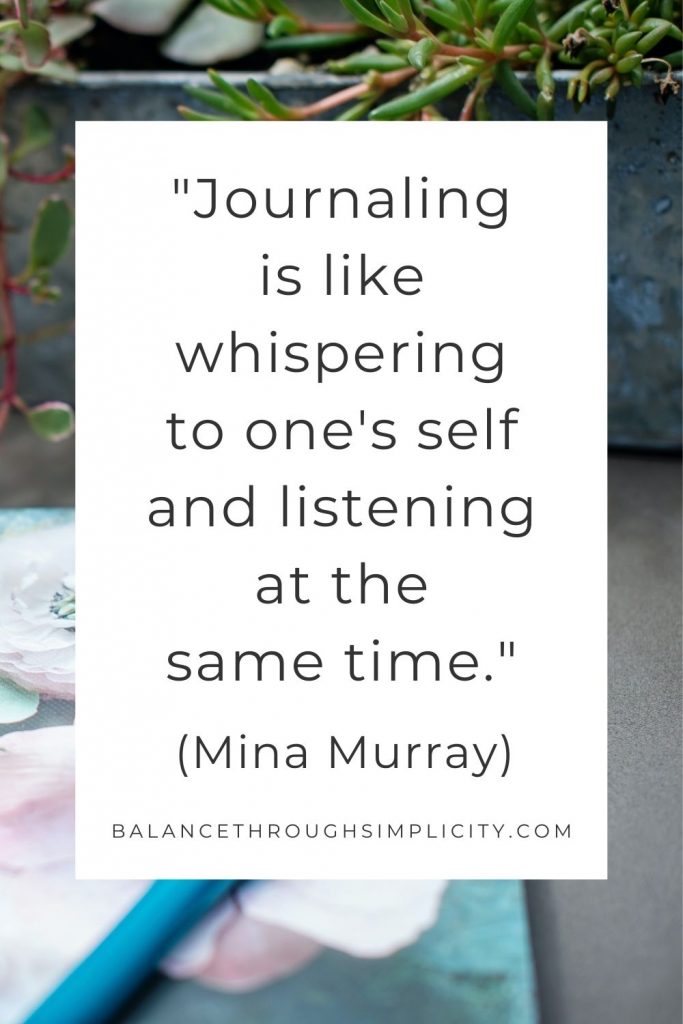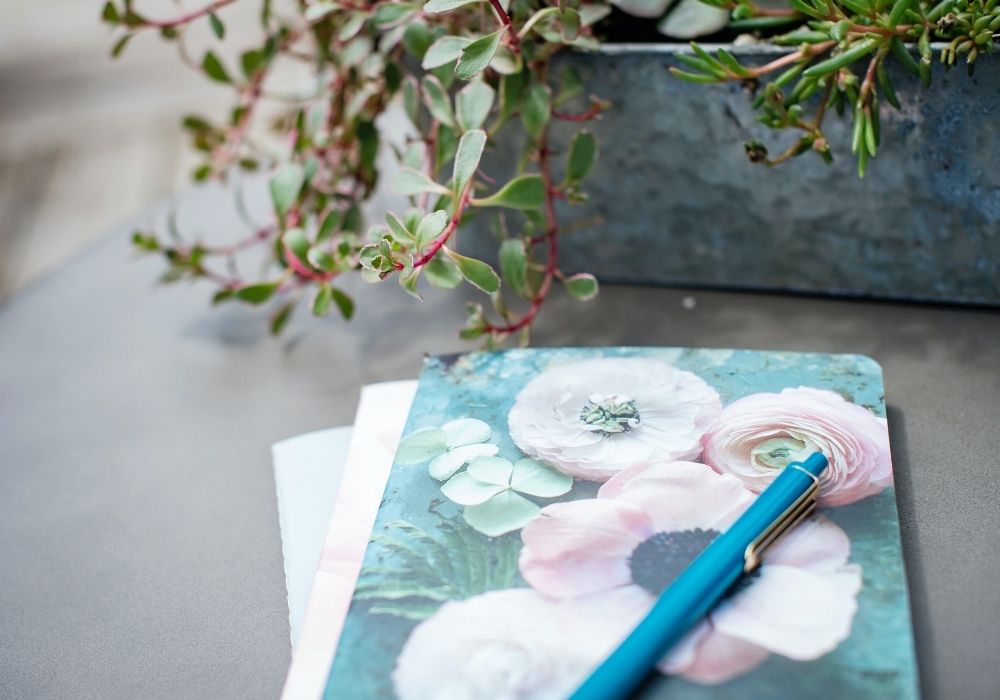JOURNALING TIPS FOR BEGINNERS TO ENCOURAGE A MEANINGFUL LIFE
Journaling is a wonderful way of exploring your thoughts and feelings. In this article I’m sharing some helpful journaling tips for beginners and 30 beginner’s journal prompts to encourage a meaningful life.
JOURNALING FOR A MEANINGFUL LIFE
I write a blog about intentional living and creating a meaningful life that has a positive impact for you and on those around you.
Living intentionally and curating a life with less clutter and distraction but more of the things that lift me up and light my fire are really only made possible by understanding what I want from life and why.
Doing the inner work by exploring my values, beliefs, priorities and what really matters to me (and my loved ones around me) is essential to fully embrace and support a meaningful and purposeful life.
If you don’t know what’s important, then how do you what to prioritise in life?
And, if you don’t prioritise things in your life, then life has a habit of choosing those priorities for you. The problem is, they’re not always one and the same though!
Clearing clutter to simplify life and make space for what’s important isn’t just about the stuff in my home, it’s also about the stuff in my heart and mind.
That’s why I believe journaling is so powerful for a meaningful life. It’s helped me find clarity over what matters and why it matters to me. I’ve learnt so much more about what I want from life, why and how to make it happen.
WHY IS JOURNALING HELPFUL?
Many people keep a diary, especially when they’re younger. My daughters do the same as part of their own little evening routines. It’s a great way of remembering your day, making note of how you’re feeling, exploring your emotions and re-connecting with yourself.
- Sometimes it’s easier to understand our emotions and thoughts when we can see them down on paper, instead of whizzing around our brains.
- Journaling is a useful technique for decluttering our mind and exploring how we think and feel about different aspects of our life.
- And, it’s often easier to share our thoughts in writing than it is to say them out loud. Journaling gives us a safe space to off-load our emotions in a non-confrontational and constructive way.
- Journaling also helps us explore and develop our thoughts and feelings so that we can get clarity and take action. Perhaps you might notice a recurring theme or emotion that you could develop or work through.
Perhaps you could use your answers to build an action plan, set of goals or make changes in your life.
These are just some of my own personal reasons for creating and sticking to a journal practice.
In this article I’m sharing some thoughts around journaling and creating a regular writing practice for yourself. They include some journaling tips for beginners who are new to the practice and perhaps a reminder for others who would like to begin journaling again.
WHAT IS JOURNALING?
Firstly, for those who are new to the idea, what exactly is journaling?
Journaling is the practice of writing down our thoughts and feelings. It’s a written record of our emotions that we can use to monitor our feelings, explore them and help understand what we’re feeling and why.
“Journaling is like whispering to one’s self and listening at the same time.” (Mina Murray)
Not only can we share our most private thoughts, but we can give support, encouragement and feedback to ourself too!
THE BENEFITS OF JOURNALING
There have been several studies around the benefits of journaling. Aside from the reasons I’ve found myself personally which I mentioned above, I thought it might be helpful to share a few research findings and studies on journaling.
Some of the benefits of journaling include:
1. Journaling reduces stress
Journaling can support better mental health. By writing down some of our more difficult emotions, such as anger or anxiety, it provides a gentle and safe outlet for them which might make us feel less stressed, angry or anxious. Similar to the practice of mindfulness, the physical act of writing brings us back to the present.
Read more about how journaling reduces stress.
2. Journaling helps to understand yourself better
Journaling is a great way of exploring your emotions and getting a better handle on what you’re thinking and why. How we think about things determines how we feel about them, including how good we feel about things and how positive we feel about our life in general.
As we make many of our decisions based on how we ‘feel’ then getting to the bottom of how we think about things is a useful exercise to understand more about the actions, decisions and choices we make and take. Journaling is helpful to understand yourself better.
3. Journaling helps you make change and take action
I love lists and brain-dumping my thoughts on to paper. My memory is dreadful and I love being able to track my progress and tick things off once a job is completed.
For both these reasons, I find the act of putting pen to paper and writing stuff down to be a great way of knowing what I have to do and when. Journaling is similar as I can use my journal responses to form a list of things to do (or not do) and come up with a plan of action or set of goals. Journaling helps with making change and taking action.
Further reading: The benefits of journaling and the scientific research on journaling and writing therapy
DIFFERENT TYPES OF JOURNAL PROMPTS
Journaling can be a useful practice for so many reasons. You can create journal prompts for different aspects of your life including journal prompts for self-care and journal prompts for self-discovery and self-reflection.
They contribute to you learning more about yourself in different ways, whether that’s simplifying your life, setting goals, staying motivated, furthering your career or living a meaningful life.

HOW TO CREATE A JOURNALING PRACTICE
Journaling is a beautiful way of spending time with yourself, honouring and giving space to your thoughts and getting to the root of what you’re thinking and why.
However, if you’re new to journaling it can be difficult to know what we’re thinking or feeling, let alone find the right words to express that on paper.
The thought of writing each day for a period of time can seem overwhelming or unrealistic if you’ve got other things that also require your time and attention. Journaling requires you to be present, not just for the writing but to be aware of your thoughts and feelings.
However, journaling doesn’t have to be time-consuming or difficult. It can be gentle, reflective and helpful in understanding yourself.
JOURNALING TIPS FOR BEGINNERS
If you’re curious to try journaling for yourself, I thought it might be helpful to share some journaling tips for beginners to help you get started.
1. Forget perfection
Don’t worry about constructing a beautiful set of prose or complete sentences. Just focus on getting your thoughts down on paper. You don’t need to aim for a varied vocabulary, short and easy words are just fine. Don’t worry either about punctuation or grammar, or how neat your handwriting is.
Aim just to capture your thoughts, feelings and responses to the journal prompts on paper. As long as you can read them back and they make sense if you ever want to re-visit them, then that’s all you need to think about now.
2. Create routine
Some people find it easier to get into the flow of writing when they make it part of their regular routine. I journal in the evening because my body and brain seem to find the act of journaling about my day more fruitful when I’ve had the day to mull things over. Others find it helpful to make journaling part of their morning routine.
Explore what works for you and, if it’s working well, try to incorporate journaling into your day at the same time and maybe even sitting in the same place.
3. Make it fun
I love to choose stationery that makes me feel creative and that I look forward to using. I prefer to buy pretty journals that I love the look of and always use the same pen, my favourite pen, which I don’t use for anything else.
My thoughts are precious and valuable and I like to keep memories of them in a beautiful notebook that will honour them. That may sound daft but I don’t feel half as inspired or motivated to keep journaling if I’m writing on tatty bits of paper!
4. Be consistent
Doing a little bit often can sound very mundane, especially as we’re used to thinking of that in terms of housework or exercise (activities that we don’t always want to do!). However, consistency is key to making something a habit and once it’s a habit, you’ll find it easier to keep it up.
Journaling is no different. As well as creating a routine where you journal at the same time, and maybe in the same place, every time, I suggest you journal for the same length of time. It could be 10-15 minutes each day, or whatever length of time feels comfortable to you. Keep it up every day and you’ll be surprised at what you write and what comes forward for you even in those few minutes.
5. Avoid distractions
Being able to listen to your inner thoughts is difficult when your outer world is noisy and distracting. Try to find a quiet space for your journaling practice. Choose a quiet corner of your home, or whilst the rest of your household is out, or before they wake up. You want to quieten your outer environment so you can focus on your inner environment.
6. Be honest
The whole point of journaling is to get your thoughts and feelings out onto paper so you can be aware of and do something with them if you need to. Journaling is a learning exercise but for that you have to be learning from the correct information. Don’t write something you don’t feel, don’t be dishonest with yourself because you’re scared to write something down. There are no rights and wrongs. You’re not supposed to feel a ‘correct’ way. Be honest with yourself within the safe space of your journal.
7. Keep it private
The point about being honest leads onto this point about keeping your journal private. If you’re unsure whether another set of eyes are going to read what you’ve written then you might feel unsafe in expressing yourself openly and honestly. Keep your journal safe and private. Only share it with someone else when you really want to.
8. Be gentle with yourself
If you have a day where your journaling doesn’t flow, know that that’s ok. Sometimes you’ll be more in tune with yourself than others. Personally, I find that days where I’ve been busy and on the go all day, are days where I struggle a little to journal. I find it difficult to switch off and feel calm enough in mind and heart to let the words flow. Instead, they feel forced. On those days, I’m gentle with myself and just write a little (often in bullet points, rather than long sentences!).
9. Have some go-to journal prompts
Sometimes we get writer’s block. For the days where you can’t think of anything to write or you just need an idea to get you started, it’s helpful to have some journal prompts prepared and ready. I’ve listed some of these journal prompts for beginners in the next section.
10. Don’t limit yourself
Write as much as you’d like. You don’t have to complete 10 pages, or 10 lines. Stop when you feel you want to, or keep writing if you have a train of thought.
11. Don’t worry about mistakes
If you write something you’d like to cross out, or a spelling mistake that you want to correct, feel free. Mistakes are normal if you’re thinking of what to write and how to write rather than how it’s going to look on the page or if you read it back. Put a line through your writing, or just carry on. Correcting your mistakes can interrupt your flow.
12. Don’t just use words
Words can convey alot but don’t forget a picture says 1000 words! You can describe your thoughts and feelings in pictures, make your journal pretty with illustrations, use coloured pens or highlighters to create a beautiful page to honour your deepest thoughts.

JOURNAL PROMPTS FOR BEGINNERS
Here are 30 journal prompts for beginners. They’re little questions designed to help you begin your journaling practice.
- Choose one a day and answer as briefly or as fully as you’d like to.
- Remember that there are no right or wrong answers here. Just be honest with yourself.
- You can re-visit the questions whenever you like.
Try not to think too deeply before you start writing. We can get held up pondering over the detail of exactly what we want to say and how we want to say it, but journaling is best when it comes spontaneously straight from the heart.
So, here are some journal prompts for beginners to help you get started:
- Today I feel…
- This week I have been grateful for…
- I am going to make time for…
- Three things I plan to do today for my health…
- When I look in the mirror I notice…
- I feel most confident when…
- I need to let go of…
- I feel confident when…
- Today I most looking forward to…
- My ideal day would look like…
- I feel most at ease when…
- The main cause of stress in my life is…
- When my home is cluttered I feel…
- What I need most today is…
- If I wrote a letter to myself it would say…
- A healthy habit I would like to begin is…
- I am most proud of myself for…
- People would describe me as…
- A lesson I have learnt this week is…
- The thing that is most important to me right now is…
- I feel most valued when…
- If I could forgive myself for one thing it would be…
- My happiest memory is…
- My core values are…
- I feel guilty about…
- If I knew I couldn’t fail then I would…
- I feel most anxious when…
- The last time I laughed was…
- When my life is too busy I feel…
- My greatest achievement this week has been…
RESOURCES FOR JOURNALING AND SELF-REFLECTION
I hope you enjoyed this article and the journaling tips for beginners that I shared. For more articles and resources on journaling and self-reflection, you might like:
- 60 positive affirmations for a positive, healthy mind
- 30-Day Gratitude Challenge
- Essential mindsets to help you get more out of life
- 35 journal prompts for decluttering your home and life with clarity and ease
- 45 Spring Journal Prompts to Inspire Reflection and Growth
- 30 journal prompts to start the week with intention and clarity (+ free printable)
- Journal Prompts for Self-Discovery
- Master Your Mindset – a powerful workbook with self-care tips for your mind

